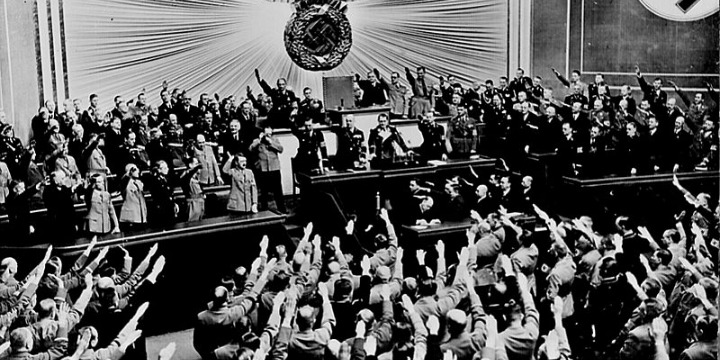Religion as Indispensable to the Social Order
 by Harold Brackman
by Harold Brackman

Nazi leader Adolf Hitler accepts the ovation of the Reichstag after announcing the ‘peaceful’ acquisition of Austria, in Berlin, Germany, March 1938. Photo: Wikimedia Commons.
Notable “New York Jewish intellectuals” such as Irving Kristol (father of Bill Kristol), Norman Podhoretz (father of John Podhoretz), Sidney Hook, Philip Rahv, and Daniel Bell all moved politically from left to right.
Will Herberg was a trendsetter among these Jewish intellectuals, beginning as a radical but ending as a conservative. That’s why John P. Diggins devoted a chapter to him in his book, Up From Communism (1975).
Herberg was born near Minsk in 1901, but grew up in Brooklyn. His divorced mother raised two sons on a housekeeper’s salary. A brilliant student, Will entered tuition-free City College of New York, but never graduated because he refused to attend military science courses.
Herberg joined the youth section of the American Communist Party, though he sided with Jay Lovestone’s more moderate faction. In 1929, when Moscow ordered the purge of “Lovestoneites,” he too was expelled.
Frightened by the rise of totalitarianism in Nazi Germany and Stalinist Russia, Herberg abandoned “the false god” of revolutionary Marxism. He worried that the US was also ripe for fascism, but feared that American entry into World War II might worsen the danger. Herberg served as educational director for the International Ladies’ Garment Workers’ Union while he studied philosophy and history in order to write Judaism and Modern Man (1951), exploring “the Jewish ethic” as a defense against “the sinfulness of human nature” in politics.
An Orthodox Jew by the 1950s, Herberg gained a reputation as a Jewish theologian knowledgeable about the thought of Martin Buber and Reinhold Niebuhr as well as the new French existentialists. But post-1948 Israel remained a blind spot in his theology, even though he was well aware of the continuing menace of antisemitism.
Herberg’s next book, Protestant/Catholic/Jew (1955), was a study of the sociology of religion. It explained how successive generations of immigrants including Jews changed from marrying almost exclusively within their own nationality group to marrying across ethnic lines into one of the three major US religious communities. Herberg became celebrated for illuminating the post-World War II religious revival in America’s suburbs. Less noticed was Herberg’s criticism of the spiritual shallowness of the suburbs’ religion-oriented “American Way of Life.” Unchecked suburban “religion-in-general” threatened to transform all three faiths into idolatrous “ersatz religions.” Yet in the context of the Cold War, Herberg came to view Judaism and Christianity as bulwarks against communism.
In the 1960s, Herberg embraced Catholic “natural law” doctrine as a weapon against rampant secularism. But when Reverend Martin Luther King, Jr. also invoked “higher law” theories to justify civil disobedience against the evils of segregation, Herberg (though no racist) criticized aspects of the civil rights movement as a threat to social stability.
Herberg co-founded the quarterly, Judaism. As a Jew, he strove to be what Reinhold Niebuhr called a “moral man in an immoral society.” Herberg also never forgot the philosophical dangers of glorifying political authority in an age in which it was being abused by undemocratic regimes around the world. But he also never fully reconciled his own evolution from a revolutionary socialist critical of religion to a supporter of religion as indispensable to the social order. Other Jewish radicals-turned-conservatives faced similar dilemmas.
Historian Harold Brackman is coauthor with Ephraim Isaac of From Abraham to Obama: A History of Jews, Africans, and African Americans (Africa World Press, 2015).
 Police Stop Anti-Zionist Agitators From Accessing Florida University President’s Home as Students Revolt Nationwide
Police Stop Anti-Zionist Agitators From Accessing Florida University President’s Home as Students Revolt Nationwide Nearly One in Five Young People Sympathize With Hamas, 29% Say US Should Reduce or End Alliance With Israel: Poll
Nearly One in Five Young People Sympathize With Hamas, 29% Say US Should Reduce or End Alliance With Israel: Poll Ilhan Omar Silent After Daughter’s Arrest, Suspension for Role in Columbia University Anti-Israel Protest
Ilhan Omar Silent After Daughter’s Arrest, Suspension for Role in Columbia University Anti-Israel Protest Cultural Center Backed by Iran’s Revolutionary Guard Plans to Produce Films About Attack on Israel
Cultural Center Backed by Iran’s Revolutionary Guard Plans to Produce Films About Attack on Israel How Does Ilhan Omar Really Feel About Iran?
How Does Ilhan Omar Really Feel About Iran? This Passover, Combine Respect for Tradition with the Courage to Innovate
This Passover, Combine Respect for Tradition with the Courage to Innovate Israel’s Iran Attack Carefully Calibrated After Internal Splits, US Pressure
Israel’s Iran Attack Carefully Calibrated After Internal Splits, US Pressure Palestinian Cameramen Exposed in New Footage Documenting Oct. 7 Atrocities Side by Side with Terrorists
Palestinian Cameramen Exposed in New Footage Documenting Oct. 7 Atrocities Side by Side with Terrorists US Money to Convicted Terrorists; US Training to Aspiring Terrorists
US Money to Convicted Terrorists; US Training to Aspiring Terrorists Man Arrested in Paris After Iran Consulate Incident
Man Arrested in Paris After Iran Consulate Incident



 This Passover, Combine Respect for Tradition with the Courage to Innovate
This Passover, Combine Respect for Tradition with the Courage to Innovate How Does Ilhan Omar Really Feel About Iran?
How Does Ilhan Omar Really Feel About Iran? Cultural Center Backed by Iran’s Revolutionary Guard Plans to Produce Films About Attack on Israel
Cultural Center Backed by Iran’s Revolutionary Guard Plans to Produce Films About Attack on Israel Ilhan Omar Silent After Daughter’s Arrest, Suspension for Role in Columbia University Anti-Israel Protest
Ilhan Omar Silent After Daughter’s Arrest, Suspension for Role in Columbia University Anti-Israel Protest Tehran Signals No Retaliation Against Israel After Drones Attack Iran
Tehran Signals No Retaliation Against Israel After Drones Attack Iran